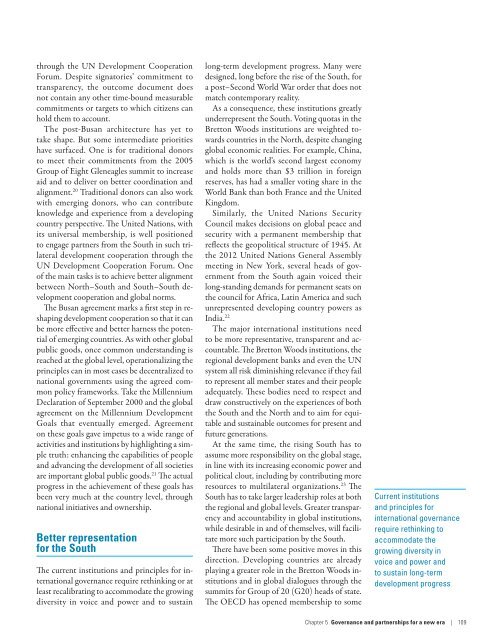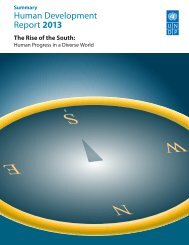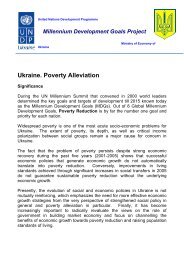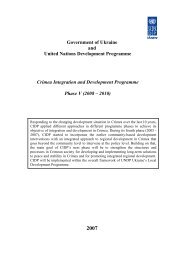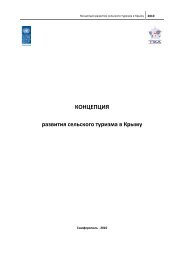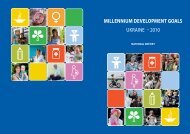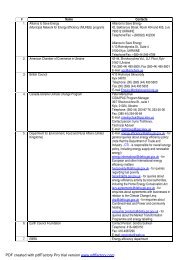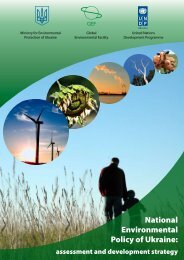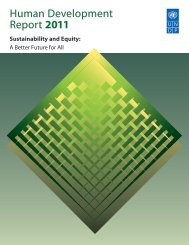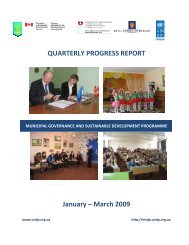E N S W - United Nations Development Programme
E N S W - United Nations Development Programme
E N S W - United Nations Development Programme
Create successful ePaper yourself
Turn your PDF publications into a flip-book with our unique Google optimized e-Paper software.
through the UN <strong>Development</strong> Cooperation<br />
Forum. Despite signatories’ commitment to<br />
transparency, the outcome document does<br />
not contain any other time-bound measurable<br />
commitments or targets to which citizens can<br />
hold them to account.<br />
The post-Busan architecture has yet to<br />
take shape. But some intermediate priorities<br />
have surfaced. One is for traditional donors<br />
to meet their commitments from the 2005<br />
Group of Eight Gleneagles summit to increase<br />
aid and to deliver on better coordination and<br />
alignment. 20 Traditional donors can also work<br />
with emerging donors, who can contribute<br />
knowledge and experience from a developing<br />
country perspective. The <strong>United</strong> <strong>Nations</strong>, with<br />
its universal membership, is well positioned<br />
to engage partners from the South in such trilateral<br />
development cooperation through the<br />
UN <strong>Development</strong> Cooperation Forum. One<br />
of the main tasks is to achieve better alignment<br />
between North–South and South–South development<br />
cooperation and global norms.<br />
The Busan agreement marks a first step in reshaping<br />
development cooperation so that it can<br />
be more effective and better harness the potential<br />
of emerging countries. As with other global<br />
public goods, once common understanding is<br />
reached at the global level, operationalizing the<br />
principles can in most cases be decentralized to<br />
national governments using the agreed common<br />
policy frameworks. Take the Millennium<br />
Declaration of September 2000 and the global<br />
agreement on the Millennium <strong>Development</strong><br />
Goals that eventually emerged. Agreement<br />
on these goals gave impetus to a wide range of<br />
activities and institutions by highlighting a simple<br />
truth: enhancing the capabilities of people<br />
and advancing the development of all societies<br />
are important global public goods. 21 The actual<br />
progress in the achievement of these goals has<br />
been very much at the country level, through<br />
national initiatives and ownership.<br />
Better representation<br />
for the South<br />
The current institutions and principles for international<br />
governance require rethinking or at<br />
least recalibrating to accommodate the growing<br />
diversity in voice and power and to sustain<br />
long-term development progress. Many were<br />
designed, long before the rise of the South, for<br />
a post–Second World War order that does not<br />
match contemporary reality.<br />
As a consequence, these institutions greatly<br />
underrepresent the South. Voting quotas in the<br />
Bretton Woods institutions are weighted towards<br />
countries in the North, despite changing<br />
global economic realities. For example, China,<br />
which is the world’s second largest economy<br />
and holds more than $3 trillion in foreign<br />
reserves, has had a smaller voting share in the<br />
World Bank than both France and the <strong>United</strong><br />
Kingdom.<br />
Similarly, the <strong>United</strong> <strong>Nations</strong> Security<br />
Council makes decisions on global peace and<br />
security with a permanent membership that<br />
reflects the geopolitical structure of 1945. At<br />
the 2012 <strong>United</strong> <strong>Nations</strong> General Assembly<br />
meeting in New York, several heads of government<br />
from the South again voiced their<br />
long-standing demands for permanent seats on<br />
the council for Africa, Latin America and such<br />
unrepresented developing country powers as<br />
India. 22<br />
The major international institutions need<br />
to be more representative, transparent and accountable.<br />
The Bretton Woods institutions, the<br />
regional development banks and even the UN<br />
system all risk diminishing relevance if they fail<br />
to represent all member states and their people<br />
adequately. These bodies need to respect and<br />
draw constructively on the experiences of both<br />
the South and the North and to aim for equitable<br />
and sustainable outcomes for present and<br />
future generations.<br />
At the same time, the rising South has to<br />
assume more responsibility on the global stage,<br />
in line with its increasing economic power and<br />
political clout, including by contributing more<br />
resources to multilateral organizations. 23 The<br />
South has to take larger leadership roles at both<br />
the regional and global levels. Greater transparency<br />
and accountability in global institutions,<br />
while desirable in and of themselves, will facilitate<br />
more such participation by the South.<br />
There have been some positive moves in this<br />
direction. Developing countries are already<br />
playing a greater role in the Bretton Woods institutions<br />
and in global dialogues through the<br />
summits for Group of 20 (G20) heads of state.<br />
The OECD has opened membership to some<br />
current institutions<br />
and principles for<br />
international governance<br />
require rethinking to<br />
accommodate the<br />
growing diversity in<br />
voice and power and<br />
to sustain long-term<br />
development progress<br />
Chapter 5 Governance and partnerships for a new era | 109


